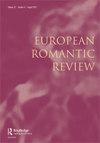伊曼纽尔·斯维登伯格的艳爱与布莱克史诗中的情色政治
IF 0.2
0 HUMANITIES, MULTIDISCIPLINARY
引用次数: 0
摘要
摘要本文认为,布莱克借鉴并修正了斯维登堡神学的某些方面,特别是“魔法之爱”的概念,构建了一个反对他那个时代倒退政治的情色世界。这篇文章将米尔顿和耶路撒冷置于18世纪末和19世纪初的史诗复兴中,认为布莱克对瑞典人思想的融合和修正有助于他挑战布莱克时代作家对古典和温和史诗传统的呼吁所支持的某些形式的厌女主义和军国主义政治。虽然许多浪漫主义时代的作家呼吁这些传统支持父权制压迫,但布莱克对瑞典人的概念和史诗比喻的运用使他能够对帝国展开尖锐的批判。他修订了瑞典堡,扩展了米尔顿对古典史诗的批判,并通过它扩展了这一时期许多史诗作品所倡导的政治。他这样做的部分原因是,他将斯维登伯格的学说重新塑造成了一种情色的愿景,这种愿景打破了浪漫主义时代史诗复兴中最糟糕的方面所倡导的战士精神背后的等级制度、厌女主义、贞洁的性观念。本文章由计算机程序翻译,如有差异,请以英文原文为准。
Emanuel Swedenborg's Conjugial Love and the Erotic Politics of William Blake's Epics
ABSTRACT This article argues that Blake draws upon and revises aspects of Swedenborg's theology, especially the concept of “conjugial love,” to construct an erotic universe that objects to the regressive politics of his age. Situating Milton and Jerusalem in the epic revival of the late-eighteenth and early-nineteenth centuries, the article argues that Blake's incorporation and revision of Swedenborgian ideas help him to challenge some forms of misogynistic, militaristic politics that writers of Blake's day were supporting with appeals to the classical and Miltonic epic traditions. While many Romantic-era writers call upon these traditions to endorse patriarchal oppression, Blake's deployment of both Swedenborgian concepts and epic tropes allows him to launch a trenchant critique of empire. He revises Swedenborg to extend Milton's critique of classical epic and, through it, the politics advocated by many of the period's epic writings. He does so in part by reworking Swedenborg's doctrines into a vision of eroticism that explodes the hierarchical, misogynistic, chaste conception of sexuality underlying the warrior ethos promoted by the worst aspects of the Romantic-era epic revival.
求助全文
通过发布文献求助,成功后即可免费获取论文全文。
去求助
来源期刊

European Romantic Review
HUMANITIES, MULTIDISCIPLINARY-
CiteScore
0.30
自引率
50.00%
发文量
61
期刊介绍:
The European Romantic Review publishes innovative scholarship on the literature and culture of Europe, Great Britain and the Americas during the period 1760-1840. Topics range from the scientific and psychological interests of German and English authors through the political and social reverberations of the French Revolution to the philosophical and ecological implications of Anglo-American nature writing. Selected papers from the annual conference of the North American Society for the Study of Romanticism appear in one of the five issues published each year.
 求助内容:
求助内容: 应助结果提醒方式:
应助结果提醒方式:


